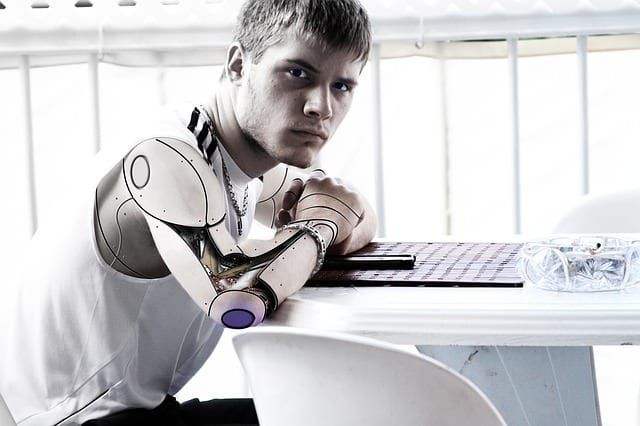We ask three of our digital marketers how they feel about robots encroaching on their jobs
There has been lots of coverage recently on the BBC about how robots are taking over more and more jobs and that a staggering 33% of junior marketers are at risk of losing their jobs to robots in the next 20 years. Within marketing, we have the rise of Marketing Automation and Programmatic Marketing, so it's not a hypothetical question. As an agency that is all for automation making our lives easier and freeing people up to do more strategic and creative activities which robots can't complete just yet, we asked some of our employees what they thought of this.

Lee Wilson, Head of SEO
In the digital arena you work with big data and machines/robots all of the time. Machines have been taking on elements of the digital marketer’s role for a number of years and this needs to be embraced.
I have zero fear of a machine taking my job, but have great expectations of machines taking on much more of my role, and freeing me up even more to complete actions where a human is best placed and delivers most value from completing.
It is this collaborative approach to working with machines/robots which is the game changer for marketers and this should be happening already in most marketing departments (especially digital marketing). If it’s not, you probably are not anywhere near as efficient or effective as you could be.
“Historically, marketing experts have been (in many cases) reluctant data scientists. When companies embrace working with deep data platforms/machines/robots, this changes, and for the better.
Robots can and should remove or dramatically reduce:
- Repeated time spent aggregating lots of shallow data points
- Tasks being completed that can be automated or have a clear logic map to follow
- Process-driven actions that have a recurring need and take time to complete
The second machine age is upon us and it’s time to start thinking ‘people plus machine’, rather than ‘people versus machine’.”
Steve Masters, Services Director
I was studying magazine journalism in the same year of the Wapping pickets – when Rupert Murdoch was moving his newspaper printing to modernised technology. When I started in publishing, we used typewriters to write on, red pen for editing, re-typing. Then we sent copy to typesetters, who would re-type it into a typesetting machine. After that, cut and paste specialists used glue and scalpels to cut up the text to paste on to layouts. Then we would edit again to make the text fit and typesetters would re-output the text for it to be re-pasted.
In just a couple of years, we were using Apple Macs and Aldus Pagemaker, later to be replaced by QuarkXPress. We no longer needed typesetters, and we saved a lot of manual hours. This did lead to people losing their jobs, but many of those people re-trained. Repro houses that didn’t close turned into DTP design studios. Typesetters turned into Quark and Photoshop layout artists.
Technology is going to kill some jobs. But will it kill marketing careers? Not if we widen our skills, accept change and prepare for it. The most important thing to consider, though, is that AI will always be one step behind people. AI plus people is a powerful combination.
Tom Chapman, Content Specialist 
If you’re regarding the development of AI with some concern, you’re certainly not the only one. After all, if the BBC’s report is accurate and 35% of jobs are at risk from being automated, there will be mass unemployment, unrest, and society - as well as our benefits system - will be unable to cope with this sudden change.
Fortunately, as marketers, we should be just fine. Machines cannot think creatively and are unable to form a viable campaign. They can provide us with the data to make informed decisions but otherwise will assist our work rather than take over it.
For example, at Vertical Leap, I use an AI called Apollo Insights to identify issues with client’s websites. This includes areas for improvement, content creation opportunities, as well as factors which really should be fixed. This makes my job easier and, as Apollo Insights is unable to complete the work itself, this means I’m still a necessary part of the campaign. However, this does not mean we should blindly accept the development of AI just because we’re ‘safe’.
As humanity, we have an obligation to ensure that those in ‘lesser’ professions are not completely replaced. As the development of AI is certainly unstoppable, legislation is needed to ensure that employers don’t put profit before the welfare of their workers. Some may call this viewpoint ‘anti-capitalist’ and throw accusations around stating that I’m getting in the way of progress - but regulations are needed to secure the following:
A skilled society
If machines start replacing junior roles, it stands to reason that entry-level jobs will be few and far between. Therefore, if AI takes over, will it still be possible for people to change professions and advance their skill sets?
Jobs and livelihoods
What’s to stop unscrupulous bosses from replacing their entire workforce with machines? In lower-skilled positions this is unfortunately a real possibility. Although business leaders would object, there must be a cap on computing power.
Profit and efficiency
Computers break - a lot. Furthermore, if machines start taking over jobs, it’s unlikely everyone will take this lying down. Therefore, corporate sabotage could become increasingly common. Humans are needed for when technology fails.
Technology is good - but only when it helps mankind
As stated, AI has the potential to really benefit our profession but to ensure that it benefits the whole of society, we need legislation and for it to be enforced by an independent body - hopefully all its workers will be human.
Conclusion
In 1800 about 60% of all jobs in the western world were in agriculture. Within 100 years the vast majority of these jobs had disappeared and agricultural employment made up less than 10% of employment in many advanced economies. Manufacturing jobs had taken their place as the mainstay of employment. Another 100 years on from that most manufacturing jobs have disappeared from the developed world and have been replaced by work in service industries. The current unemployment rate which averages about 5% is hardly above what most economists take to be the 'natural' rate. This suggests these kinds of charges are common place and society will be able to adjust once more to major changes in the nature of employment. The only difference is that this time it will be happening even faster. Tens of years rather than hundreds. For marketers this means concentrating on how they can use new technology to enhance their abilities rather than worrying about technology replacing them. The very best thing they can do is invest in continually improving their skills. It will be the unskilled, repetitive tasks which will be the first to be automated. It'll be a long time until we have machines heading marketing departments, deciding on what copy to use and rolling out new campaigns. By the time they can do that, we might not have to worry about employment at all. As Buckminster Fuller said in 1970:
We should do away with the absolutely specious notion that everybody has to earn a living. It is a fact today that one in ten thousand of us can make a technological breakthrough capable of supporting all the rest.

Thanks to
Michelle Hill for sharing their advice and opinions in this post. Michelle is the Marketing Manager at Smart Insights Content Partner
Vertical Leap. She has worked in B2C and B2B marketing for over 15 years with previous experience in the recruitment, leisure and printing industries. You can follow her on
Twitter or connect on
LinkedIn.







 Thanks to
Thanks to 



